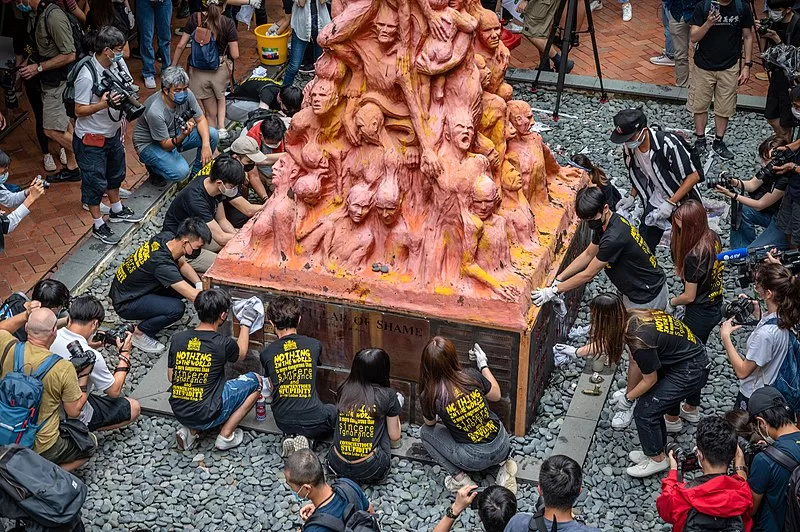As always the Chinese authorities cracked down on public commemorations of the 1989 Tiananmen Square massacre, which occurred 34 years ago last Sunday. As always more things were added to the list of what cannot be said in the lead-up. And as always people got creative in their response to getting round the censorship. Here’s a roundup of what happened recently for the anniversary Beijing would rather we all forgot.
White candles not welcome
Armoured police vehicles were deployed and hundreds of police conducted stop and search operations near Victoria Park in Hong Kong, where vigils for the victims of the massacre had previously been held for decades. The UN were “alarmed” that 23 people were arrested on Sunday for “breaching the peace”, including a veteran activist knows as “Grandma Wong”. A solitary elderly man who held a candle on a street corner was also reported to have been arrested. Commemorations of the event have become increasingly off-limits in the city state since China imposed a sweeping national security law in 2020. Still, Twitter was filled with images of people lighting candles from the relative safety of their own homes in Hong Kong.
Don’t mention Sitong Bridge
Words or symbols that reference the massacre are notoriously scrubbed from the internet by the Chinese authorities. Last week, this censorship extended to the Sitong Bridge in Beijing, when Chinese language online searches of the bridge yielded no results. It comes after a banner was unfurled on the bridge in 2022 calling for the removal of Chinese president Xi Jinping. A Weibo post by the British Embassy in Beijing showing how the Chinese state media originally reported the massacre (namely in more detail than the silence now, with state media making reference to mass casualties in hospital at the time) was removed by the authorities. The anniversary is sometimes known as “internet maintenance day” because of the number of websites taken offline.
Literary pursuits
In the weeks building up to the anniversary, it was reported that books and videos about the massacre were pulled from Hong Kong public libraries, after government auditors requested works that were “manifestly contrary” to national security be taken away. Wio News reported in mid-May that searches of library archives involving keywords on the massacre turned up no articles or references.
Tiananmen Square surveilled
No shocker here, but worth saying nonetheless – any form of rally or protest was absent at Tiananmen Square in Beijing on Sunday due to additional security checks in the area. Pedestrians on Changan Avenue, running north of the square, were stopped and forced to present identification. Journalists were also told they need special permission to be in the area.
New York new museum
A new museum dedicated to the Tiananmen Square massacre opened on Friday in New York. Zhou Fengsuo, who opened the exhibit as part of the 4th June Memorial Museum, felt it was needed as a pushback to the decades-long campaign by the CCP to eradicate remembrance of the massacre around the world. Despite being in the USA, there are still security fears for the museum’s workers. Speaking about how the museum will operate a visitor booking system, Wang Dan, a former student leader during the Tiananmen protests, told the Guardian: ““We cannot open the door for anyone who wants to come in because we’re really worried they [the Chinese embassy] will send somebody.”
The world remembers
Commemorations for the massacre were held around the world, including in Sydney, where speakers included exiled former diplomat Chen Yonglin, and demonstrators chanted “Free Hong Kong”. In London, hundreds gathered outside the Chinese Embassy calling for justice for the victims of the massacre, and for the release of human rights lawyer Chow Hang-Tung. Over in Taipei in Taiwan, less than a month after the seizure of Hong Kong’s “Pillar of Shame”, a statue commemorating the victims of the massacre, people gathered around a replica on Sunday as part of the city’s commemorations. Now the only place in the Chinese-speaking world to openly hold a memorial, organisers hoped to show solidarity with both Hong Kong and Chinese dissidents.






